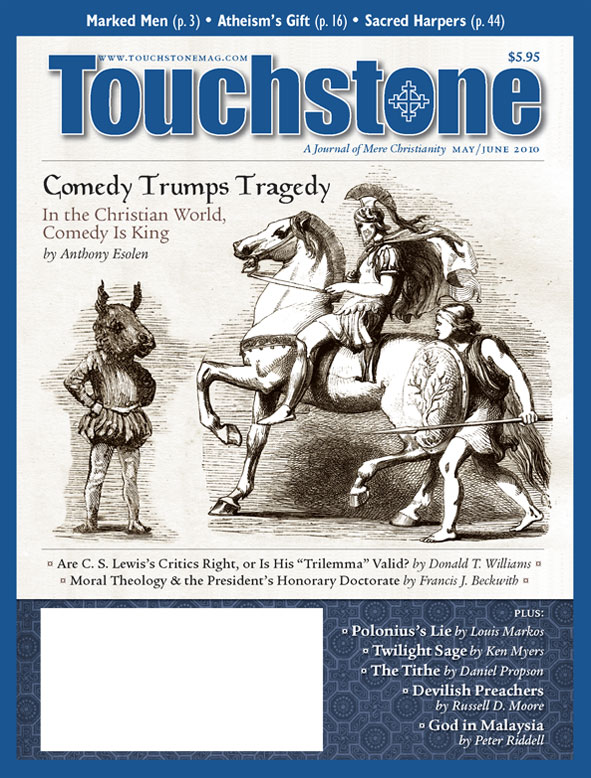Wesleyan Surge
Taking Back the United Methodist Church
by Mark Tooley
Bristol House Ltd., 2008
(240 pages, $14.95, paperback)
reviewed by William Murchison
Now what could be wrong with the Methodists? Pillars of the community; belters-out of old-time hymns; contributors to assorted good causes, religious and secular both—such were the Methodists I grew up with. I was one myself, prior to reading, kneeling, and prayer-booking my way into the Episcopal Church in the late 1960s. I know the people Mark Tooley is talking about. Better people you couldn’t hope to meet.
Their leaders, though; their spokesmen, pastors, bishops, and theologians—that’s where the trouble starts. What trouble? Just the usual stuff in today’s mainline churches—affirmation of homosexuality, skepticism concerning historic Christian truths and doctrines, and opposition to the flexing of American power in defense of American ideals.
No one can know better than does Mark Tooley what’s wrong with the Methodists, late twentieth and early twenty-first century versions. For twenty years, this courageous layman—who’s still a young man by most standards, including my own—has worked to slow, and, where possible, push back against, the leadership’s leftward lurch. His invigorating account of two decades on the Methodist front lines suggests the possibilities that inhere, even today, in principled resistance to waywardness and folly.
It can be hard to remember, against the backdrop of Methodist quarrels and spats over left-wing politics and morality, how very much H. L. Mencken loved to inveigh against the Methodist brethren of his time (the “Wesleyans,” he generally called them) as pillars of reaction. To Mencken, Methodists typified the reactionary cast of the “boo-boisie.” Why didn’t they just get out of the way and let a man read Darwin over two or three shots of bootlegged hooch?
The Methodists of ye olden time were indeed by modern standards a repressed breed: opposed to drinkin’, dancin’, and carryin’ on; inclined on secular occasions to vote conservative. But that was before the 1960s washed over the whole of American society.
A Questioning, Querulous Period
As a young reporter in May 1968, I covered, every day for two weeks, the Methodist General Conference in Dallas, at which the old Methodist Church, in full ecumenical flight, swallowed up the Evangelical United Brethren, becoming thereby the “United Methodists”—a term that to this day gives me trouble. The old dispensation was falling apart even then, despite the eloquent and continuous cries of protest from a former American Bar Association president, John C. Satterfield, who helped represent Mississippi at the General Conference. Among the few signs of old-time Methodism that I glimpsed was the ruckus occasioned by a proposal to allow the substitution of wine for good ol’ Methodist grape juice at communion. Such a measure would water down the church’s stand against drinking, it was argued. The proposal failed.
Twenty years or so later, around the time Mark Tooley realized his vocation as watchdog of the Methodist flock, the church’s General Board of Global Ministries was carrying on (says the author) “highly divisive political action of the far left . . . granting hundreds of thousands of dollars to groups supportive of, and closely related to, radical and openly Marxist causes.” Nor did the board seem much concerned with evangelism, believing as it did, says Tooley, that “if heaven existed, everybody was automatically going there, no matter what one’s beliefs or behavior.”
If heaven existed! Well, didn’t it? Such was the universal Christian teaching, as affirmed by, among others, the Methodists from the time they departed the Church of England. The 1960s had been a questioning, querulous period, during which it became common inside and outside the mainline churches to probe anything and everything sporting a little antiquity. The United Methodists grew less and less united as free spirits in the pulpit and the administrative offices began to ask whether the wool hadn’t been pulled over Christian eyes—by Christians—for an absurdly long period of time.
At the local-church level, the good old Methodists I had known kept coming to church, kept belting out the old hymns (now mingled with new ones intended to entrench the cause of “diversity”), and generally kept the faith. That they did so with greater and greater success was attributable to the work in the trenches of, among others, Mark Tooley, who, ensconced at the Institute for Religion and Democracy in Washington, D. C., rang alarm bells until they penetrated the consciousness of grassroots pastors and laymen.
Brighter Prospects
Taking Back the United Methodist Church—taking it back from Methodists with new, odd spins on very old ideas—makes for lively, engaging reading. Wherever the new Christianity reared its head among United Methodists, there were Tooley and the IRD (of which he is the new president) to say, Hold on just a minute here. A lot of people to whom he said it—substantial pastors, bishops even—didn’t like hearing it and told Tooley so. That wasn’t the point. The point was the gospel of Christ, unchangeable by the will of church assemblies and boards, be they never so delicately attuned to the spirit of the secular world and its politics.
Tooley is feeling better about his church and its prospects than he was when he began peering over the bishops’ and board members’ shoulders. True, the global missions board still gives money to left-wing causes abroad, but the disposition to resist same-sex agendas seems to have grown rather than waned, as evidenced by the votes at recent General Conferences.
“Successful United Methodist clergy,” Tooley says,
realize that Americans under the age of 50 are mostly indifferent to denominational labels. . . . Younger American church goers will go to churches where they are spiritually nourished. State churches, whatever their label, will not long retain more than a few steadfast and increasingly aging denominational loyalists. . . . Even most liberal church agencies realize that the church is evolving in a more evangelical and international direction.
Here, meantime, come the evangelical and traditionalist Methodists of Africa to stand with their white brethren in the States on behalf of the old-time, and eternal, religion. It’s the same with the evangelical and traditionalist Anglicans of Africa, as they line up in still greater numbers in support of their sorely estranged co-religionists over here. Whatever the mainline “progressives” suppose themselves to have won since the 1960s, maybe they’d better check the sack.
William Murchison a syndicated columnist, is author of Mortal Follies: Episcopalians and the Crisis of Mainline Christianity (Encounter Books).
subscription options
Order
Print/Online Subscription

Get six issues (one year) of Touchstone PLUS full online access including pdf downloads for only $39.95. That's only $3.34 per month!
Order
Online Only
Subscription

Get a one-year full-access subscription to the Touchstone online archives for only $19.95. That's only $1.66 per month!
bulk subscriptions
Order Touchstone subscriptions in bulk and save $10 per sub! Each subscription includes 6 issues of Touchstone plus full online access to touchstonemag.com—including archives, videos, and pdf downloads of recent issues for only $29.95 each! Great for churches or study groups.
Transactions will be processed on a secure server.
more from the online archives
calling all readers
Please Donate
"There are magazines worth reading but few worth saving . . . Touchstone is just such a magazine."
—Alice von Hildebrand
"Here we do not concede one square millimeter of territory to falsehood, folly, contemporary sentimentality, or fashion. We speak the truth, and let God be our judge. . . . Touchstone is the one committedly Christian conservative journal."
—Anthony Esolen, Touchstone senior editor









